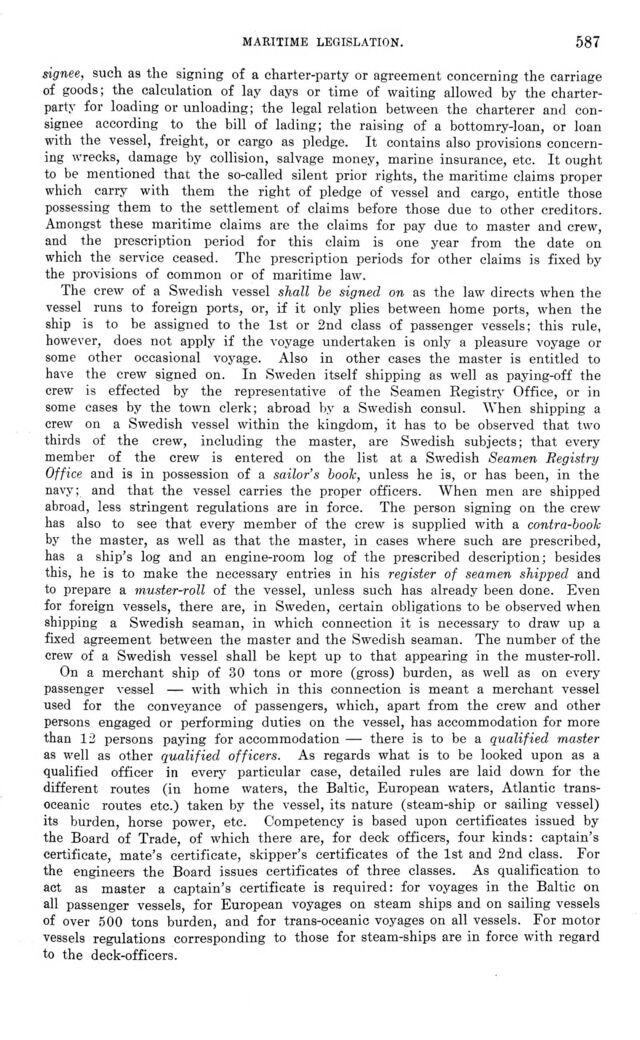
Full resolution (JPEG) - On this page / på denna sida - IX. Shipping and Navigation. By H. Rosman - Maritime Legislation. By E. Modig

<< prev. page << föreg. sida << >> nästa sida >> next page >>
Below is the raw OCR text
from the above scanned image.
Do you see an error? Proofread the page now!
Här nedan syns maskintolkade texten från faksimilbilden ovan.
Ser du något fel? Korrekturläs sidan nu!
This page has never been proofread. / Denna sida har aldrig korrekturlästs.
maritime legislation.
587
signee, such as the signing of a charter-party or agreement concerning the carriage
of goods; the calculation of lay days or time of waiting allowed by the
charter-party for loading or unloading; the legal relation between the charterer and
consignee according to the bill of lading; the raising of a bottomry-loan, or loan
with the vessel, freight, or cargo as pledge. It contains also provisions
concerning wrecks, damage by collision, salvage money, marine insurance, etc. It ought
to be mentioned that the so-called silent prior rights, the maritime claims proper
which carry with them the right of pledge of vessel and cargo, entitle those
possessing them to the settlement of claims before those due to other creditors.
Amongst these maritime claims are the claims for pay due to master and crew,
and the prescription period for this claim is one year from the date on
which the service ceased. The prescription periods for other claims is fixed by
the provisions of common or of maritime law.
The crew of a Swedish vessel shall be signed on as the law directs when the
vessel runs to foreign ports, or, if it only plies between home ports, when the
ship is to be assigned to the 1st or 2nd class of passenger vessels; this rule,
however, does not apply if the voyage undertaken is only a pleasure voyage or
some other occasional voyage. Also in other cases the master is entitled to
have the crew signed on. In Sweden itself shipping as well as paying-off the
crew is effected by the representative of the Seamen Registry Office, or in
some cases by the town clerk; abroad by a Swedish consul. When shipping a
crew on a Swedish vessel within the kingdom, it has to be observed that two
thirds of the crew, including the master, are Swedish subjects; that every
member of the crew is entered on the list at a Swedish Seamen Registry
Office and is in possession of a sailor’s book, unless he is, or has been, in the
navy; and that the vessel carries the proper officers. When men are shipped
abroad, less stringent regulations are in force. The person signing on the crew
has also to see that every member of the crew is supplied with a contra-boolc
by the master, as well as that the master, in cases where such are prescribed,
has a ship’s log and an engine-room log of the prescribed description; besides
this, he is to make the necessary entries in his register of seamen shipped and
to prepare a muster-roll of the vessel, unless such has already been done. Even
for foreign vessels, there are, in Sweden, certain obligations to be observed when
shipping a Swedish seaman, in which connection it is necessary to draw up a
fixed agreement between the master and the Swedish seaman. The number of the
crew of a Swedish vessel shall be kept up to that appearing in the muster-roll.
On a merchant ship of 30 tons or more (gross) burden, as well as on every
passenger vessel — with which in this connection is meant a merchant vessel
used for the conveyance of passengers, which, apart from the crew and other
persons engaged or performing duties on the vessel, has accommodation for more
than 12 persons paying for accommodation — there is to be a qualified master
as well as other qualified officers. As regards what is to be looked upon as a
qualified officer in every particular case, detailed rules are laid down for the
different routes (in home waters, the Baltic, European waters, Atlantic
transoceanic routes etc.) taken by the vessel, its nature (steam-ship or sailing vessel)
its burden, horse power, etc. Competency is based upon certificates issued by
the Board of Trade, of which there are, for deck officers, four kinds: captain’s
certificate, mate’s certificate, skipper’s certificates of the 1st and 2nd class. For
the engineers the Board issues certificates of three classes. As qualification to
act as master a captain’s certificate is required: for voyages in the Baltic on
all passenger vessels, for European voyages on steam ships and on sailing vessels
of over 500 tons burden, and for trans-oceanic voyages on all vessels. For motor
vessels regulations corresponding to those for steam-ships are in force with regard
to the deck-officers.
<< prev. page << föreg. sida << >> nästa sida >> next page >>